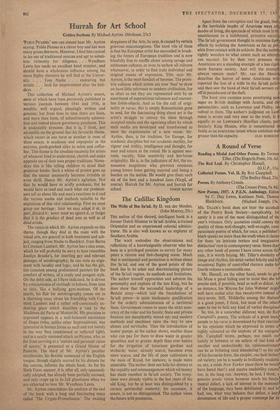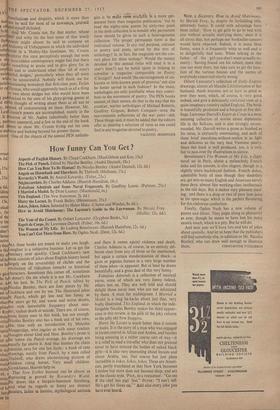A Round of Verse
(0.U.P., 15s
Collected Poems. Vol. II. By Roy Campbell.
(The Cresset Press, 9s. 6di New Poems, 1957. A P.E.N. Anthology. Edite by C. Day Lewis, Kathleen Nott, Thoma Blackburn. (Michael Joseph, 15s.
MR. TILLER'S book does not bear the accolad of the Poetry Book Society—inexplicably, fo surely it is one of the most distinguished of th year's volumes. Only quotation could convey the quality of these well-thought, well-wrought, corn passionate poems of which, for once, a publisher' blurb speaks no more than the truth when it claim. for them 'an intricate texture and imaginative distinction' rare in contemporary verse. More that any other book of poems I have cone across thia year, it is worth buying. Mr. Tiller's dexterity 4 image and rhythm, his strict verbal felicity and h4 occasional flights of controlled rhetoric make hid fourth volume a memorable one.
Mr. Hassall, on the other hand, needs to givc his Muse a good hiding and to insist that she be precise and, if possible, brief as well as dulcet. ,0 an instance, his 'Rhyme for John Webster' might' well have ended after line twenty-two instead of sixty-seven. Still, `Holderlin among the Statues' is a good poem, I think, but most of the others,' seem to me to lack any kind of verbal discipline:2 So, too, in a somewhat different way, do Roy( Campbell's poems. The attitude of a great mane people to his verse is determined by their reactionl to his opinions which he expressed in terms ast highly coloured as the exploits of his energetic' life. Campbell wrote, perhaps, too much to hastily in between or on safaris of one kind orf another and undoubtedly his opinionativenesst can be as irritating (and stimulating?) as his use of his favourite form, the couplet, can lack techniA, cal variety; yet he is mostly as brilliantly readable as, say, a snide New Yorker piece (how he would' have hated that !) and maybe readability counts' too, in the long run. Anyway, he had, I think, a genuine poetic vision however much his funda$ mental defect, a lack of interest in the moments] of the language, may have debilitated it; and he" had, too, what may balance that defect, a lusty] domination of life and a proper contempt for its the s a brin ;ciet the ; po uth tem at rig; imp eul humiliations and despairs, which is more than can be said for most of us nowadays, yourself and myself included.
And Mr. Cronin too, for that matter, whose deft and witty (in the best sense of that word) ems might almost be said to compose an natomy of Unhappiness in which the individual xists in a Molloy-like loneliness. Mr. Cronin xplores this state perceptively enough but even noia-ridden contemporary might feel that there s something to praise and to give glory for in .fe and to understand other than `all of man's itiful dodges,' particularly when they all seem be unsuccessful. Nobody will thank me for entioning nowadays that first-class poet, Dylan homas, who could apparently teach us all a thing 'r two about dodges but who would have been hocked to the core of his glory-giving genius at he thought of writing about them at all not to Peak of concentrating on them. However, Mr. onin's poems are accomplished, mostly in the anner of Mr. Auden (admittedly better than ost manners), and a few at the end of the book m to show Mr. Cronin trying out his own °ice and looking beyond his present theme. One of the objects of the annual PEN antholo- gies is 'to make Verse available in a more per- manent form than magazine publication,' but to read the eighty-nine poems by sixty-two poets in the sixth collection is to wonder why permanent form should be given to such a heterogeneous collection. The proper permanent form is the individual volume. Is any real purpose, relevant to poetry and poets, served by this sort of anthology? Is, in fact, the magazine not•the cor- rect place for these tastings? Would the money devoted to this annual (who will read it in a year's time?) not be better spent in helping to subsidise a magazine comparable to Poetry (Chicago)? And would 'the encouragement of un- known or little-known poets of promise,' not also be better served in such fashion? In the main, anthologies are only justifiable when they contri- bute to the movement of poetry. The PEN books cannot, of their nature, do that in the way that the crankier, wartier anthologies of Michael Roberts, Geoffrey Grigson, Robert Conquest—even the neo-romantic collections of the war years—did. These things said, it must be added that the editors offer as pleasing a selection of verse as one could find in any magazine devoted to poetry.
VALENTIN IREMONGER



























 Previous page
Previous page